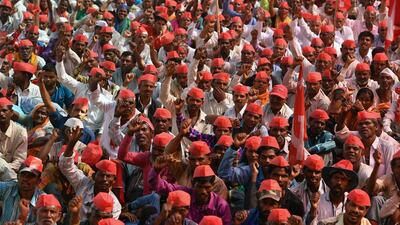Nearly 50,000 farmers marched from rural Maharashtra into the city of Mumbai on Monday to protest against the government’s failure to resolve an agricultural crisis gripping the state.
Having begun walking six days ago from Nashik, 180 kilometres outside Mumbai, the farmers entered the city in near-silence early on Monday morning. As the light grew over the city, the procession, holding up banners of various unions and communist parties, resembled a river of red flowing through the Eastern Express Highway.
By 7am the farmers had reached Azad Maidan, an open space in south Mumbai. Their pre-dawn entry into Mumbai had been timed to minimise traffic disruptions for commuters, a representative of the All Indian Kisan Sabha (AIKS), a farmers’ union, told the news channel NDTV.
In the afternoon, a 12-member delegation of farmers met Maharashtra's chief minister, Devendra Fadnavis, who assured them his government would begin to meet their demands within two months.
“We’re positive in fulfilling demands,” Mr Fadnavis said on Twitter. He claimed that his government had tried to start negotiations with the farmers after they set out from Nashik “but they were firm on taking out the march”.
Maharashtra’s farm sector production grew by 22.5 per cent in 2016-17, but last year the sector shrank by 8.3 per cent because of insufficient rainfall and an infestation of pink bollworm.
The farmers are also complaining that the government’s support price – the minimum price at which it buys grains and other produce – is too low, and that their land rights are frequently infringed upon or neglected.
The crop failures last year were part of a larger pattern of hardship for Maharashtra’s farmers. At least half of the state’s agricultural households are in debt, and farmers who are unable to repay their loans frequently kill themselves. Last year, Maharashtra registered 2,414 farmer suicides between January and October.
The pattern repeats itself around the country. Roughly 263 million Indians work in agriculture, either as farmers or labourers; in total, 600 million people rely upon the sector for their livelihood.
______________
Read more:
India food crisis likely if climate change continues: report
India agriculture’s growing crisis
India’s farmer suicides soar as expectations for better life grow
______________
The average monthly income of a farming household is 6,426 rupees (Dh363), but the average debt per household is 47,000 rupees. In 2016, a year that witnessed abundant rainfall, 11,458 farmers killed themselves across India – the lowest figure in nearly two decades.
Last year, Maharashtra provided a limited waiver of loans, relieving each farmer of up to 150,000 rupees of debt. The cost to the treasury was estimated to be roughly 340 million rupees.
But Ashok Dhawale, the president of the AIKS, said on Monday that the implementation of the waiver had been patchy. Among the farmers’ demands is full loan relief – without the 150,000-rupee ceiling.
Mr Dhawale said farmers wanted the government to stop acquiring agricultural land for “fancy and elitist projects” such as Prime Minister Narendra Modi’s beloved bullet train link, and to increase crop support prices.
He said farmers from Maharashtra’s indigenous tribes, who often have no formal title to land they have lived on for centuries, were being displaced. The government “should vest land in the names of the tribals, who have been cultivating it for several generations”, Mr Dhawale said.
Once Mr Fadnavis’ government made its promises, the farmers prepared to leave the city aboard trains arranged by the government.
Dozens of Mumbai residents had turned out to show support for the farmers as they marched through Mumbai in the morning, visiting sections of the Eastern Express Highway to offer them biscuits, dates and water.
Many of the farmers were barefoot, said Nitin Rane, a university student who joined his sister in handing out paper cups of water.
“At the time, I didn’t fully understand what the protest was about,” Mr Rane said. “After I came home, I read the papers and got a better sense of it. And I hope the government helps the farmers out.
“Somewhere today I read this sentence about the farmers – that these are the people who feed us, and so we should be happy to feed them in turn as well,” he said. “It’s important for India that its farmers do well.”

